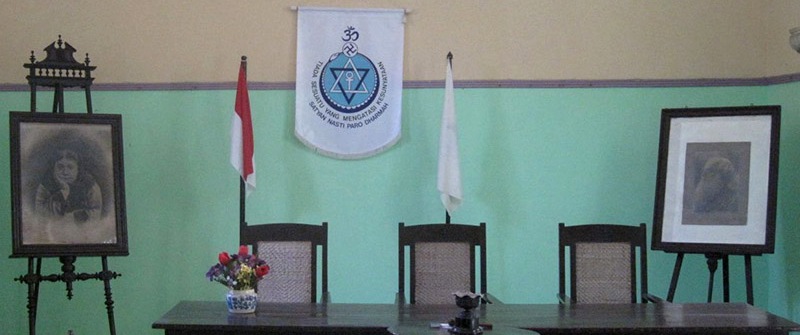
05 Feb Psalm of life (blog by Marieke Bloembergen)
Any historian and social scientist will have his or her collection of missed opportunities: an interview going into an unexpected direction, or a source with no direct value for your actual research, yet, highly interesting for other queries. You keep them in mind, for later.
Such witnesses despite themselves unfortunately can get lost, and old informants pass away. You can only regret: all those questions that you now have, but did not pursue then, when they might have led your queries of today further.
Exploring, for a new research project, clues for the connections between (international) scholarly and spiritual knowledge networks in colonial and postcolonial Indonesia, I was reminded of Nyonya Rajasti Sourachman, caretaker of the Pakualam Palace’s library in Yogyakarta. I met Sourachman when, late 1996, I was conducting my PhD research on the makings of the Dutch colonial entries at the world exhibitions. She guided me through what I saw then as a wonder cabinet: personal correspondence, school material and private book collections, having all belonged to Pakualaman’s sons and daughters. ‘Here is where we keep the spiritual’, summarized Sourachman.
Meanwhile 76 year-old Sourachman, said to be a granddaughter of Pakualam VI, dressed in sarong and kebaya, with sparkling eyes behind big glasses, taught me lessons I did not ask for – moreover in Dutch: about the wellness of ‘the immaterial’ which connected everybody, about theosophy and about the importance of organized association in colonial times. Standing before a shelf, she took Blavatsky’s De sleutel tot de Theosophie (The key to theosophy, 1889) and said: ‘It doesn’t have to be done by war’.
As chairman of the Indonesian delegation of the Theosophical Society she was often called to report on the Society’s international activities. This was part of general restrictive policies towards the Theosophical Society, which started under president Soekarno who, in June 1963, shortly banned the Society as part of his measures against international organizations. But in the same year the Society rose again, now as strictly Indonesian, independent from the headquarters in Adyar (India). Under president Soeharto the Theosophical Society became a ‘tradition’, not a religion.
At the end of her lesson in theosophy and life, for this was hardly a conversation, she recited from the poem ‘Psalm of life’ (1838), by the nineteenth-century American poet, Henry Wadsworth Longfellow, which she had learned at the Hollands-Inlandsche School. She urged me to read ‘The Prophet’ (1923) by the Libanese painter and writer Khalil Gibran (1883-1931). I know now (not then) that this poem, popular in the 1930s, also became the bible of the hippies of the 1960s and 1970s who flocked to India, on the famous hippietrail, which also led to gurus and theosophists in Indonesia – precisely the kind of connections that are key to my new research.
But this was 1996. Sourachman emphasized I should come to Yogya for a longer period after I finished my PhD thesis. I could stay at her place, and she would tell me much more. None of this materialized. So much for missed opportunities.




No Comments